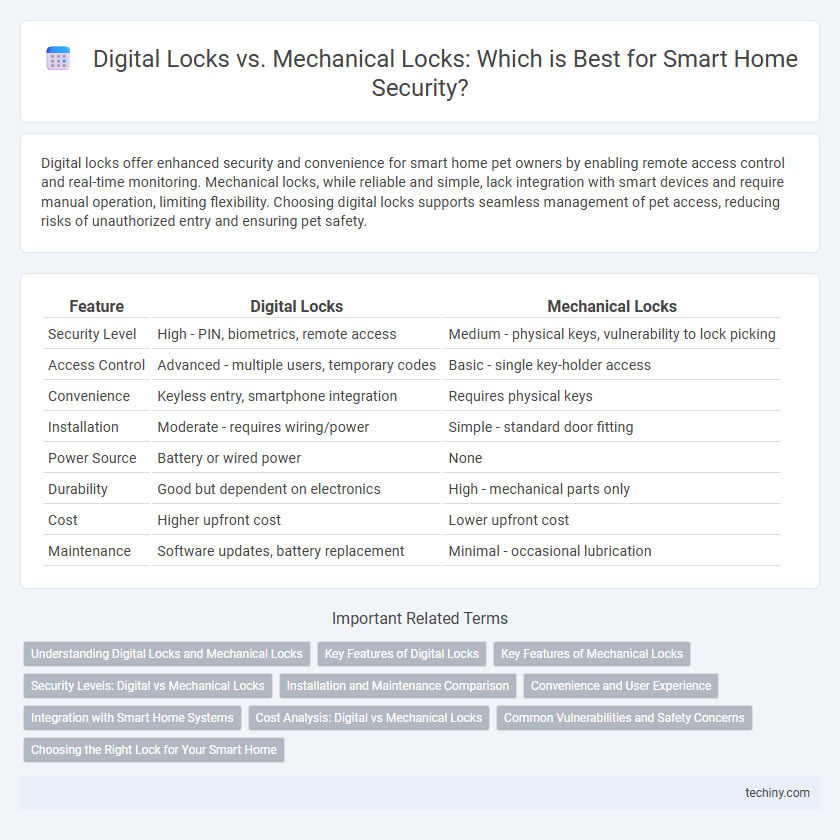Digital locks offer enhanced security and convenience for smart home pet owners by enabling remote access control and real-time monitoring. Mechanical locks, while reliable and simple, lack integration with smart devices and require manual operation, limiting flexibility. Choosing digital locks supports seamless management of pet access, reducing risks of unauthorized entry and ensuring pet safety.
Table of Comparison
| Feature | Digital Locks | Mechanical Locks |
|---|---|---|
| Security Level | High - PIN, biometrics, remote access | Medium - physical keys, vulnerability to lock picking |
| Access Control | Advanced - multiple users, temporary codes | Basic - single key-holder access |
| Convenience | Keyless entry, smartphone integration | Requires physical keys |
| Installation | Moderate - requires wiring/power | Simple - standard door fitting |
| Power Source | Battery or wired power | None |
| Durability | Good but dependent on electronics | High - mechanical parts only |
| Cost | Higher upfront cost | Lower upfront cost |
| Maintenance | Software updates, battery replacement | Minimal - occasional lubrication |
Understanding Digital Locks and Mechanical Locks
Digital locks use electronic mechanisms and often incorporate keypads, biometric scanners, or smartphone connectivity for access control, enhancing security and convenience. Mechanical locks rely on physical keys and traditional tumblers or pins, providing a straightforward, battery-free locking solution. Understanding the operational differences, security features, and user interaction helps homeowners choose the ideal lock type for their smart home security system.
Key Features of Digital Locks
Digital locks offer advanced security features such as remote access control, biometric authentication, and real-time activity monitoring, enhancing home safety and convenience. They enable keyless entry using smartphones or security codes, reducing the risk of lost or duplicated keys. Integration with smart home systems allows seamless automation and alerts for unauthorized access attempts.
Key Features of Mechanical Locks
Mechanical locks rely on traditional pin tumbler or wafer mechanisms, providing robust physical security without requiring power or connectivity. They offer simplicity, durability, and resistance to electronic hacking, making them reliable for long-term use in smart home environments. Common key features include manual key access, straightforward installation, and compatibility with existing door frameworks.
Security Levels: Digital vs Mechanical Locks
Digital locks offer enhanced security levels through features like encryption, biometric authentication, and remote access control, reducing vulnerabilities associated with physical keys. Mechanical locks rely on traditional key mechanisms that can be susceptible to lock-picking, bumping, and unauthorized key duplication. Integrating digital locks within a smart home system provides real-time alerts and access logs, significantly improving monitoring and security compared to mechanical locks.
Installation and Maintenance Comparison
Digital locks require professional installation due to their electronic components and integration with smart home systems, while mechanical locks offer straightforward, DIY-friendly installation. Maintenance of digital locks includes software updates, battery replacement, and occasional troubleshooting of connectivity issues, contrasting with the minimal upkeep needed for mechanical locks, such as lubrication and key duplication. The complexity of digital locks demands regular technical attention, whereas mechanical locks rely on physical durability and simpler mechanical adjustments.
Convenience and User Experience
Digital locks offer superior convenience through keyless entry options such as PIN codes, biometrics, and smartphone apps, streamlining user access without physical keys. Mechanical locks, while reliable, require manual key handling, limiting ease and speed of use in daily routines. The user experience with digital locks is enhanced by features like remote access, temporary codes for guests, and integration with smart home systems, providing flexible and secure control over home entry.
Integration with Smart Home Systems
Digital locks offer seamless integration with smart home systems, enabling remote access control, real-time monitoring, and automated locking schedules through mobile apps or voice assistants like Alexa and Google Home. Mechanical locks, while reliable, lack connectivity features and cannot be managed or monitored remotely, limiting their functionality within a smart home ecosystem. The compatibility of digital locks with smart hubs enhances overall security and convenience, making them a preferred choice for modern smart home integration.
Cost Analysis: Digital vs Mechanical Locks
Digital locks typically involve higher upfront costs, ranging from $150 to $400, due to advanced technology and installation requirements, whereas mechanical locks generally cost between $20 and $100. Maintenance expenses for digital locks may include battery replacements and software updates, increasing long-term costs, while mechanical locks require minimal upkeep. Evaluating total cost of ownership, mechanical locks offer a budget-friendly option, but digital locks provide enhanced security features that can justify the investment.
Common Vulnerabilities and Safety Concerns
Digital locks on smart home doors are prone to cyberattacks such as hacking, signal interference, and software glitches that can compromise security and user privacy. Mechanical locks, while immune to digital tampering, face vulnerabilities including lock picking, bumping, and physical wear that may lead to key duplication and forced entry. Homeowners must weigh the risks of digital vulnerabilities like hacking against mechanical weaknesses like forced bypass when choosing an optimal lock solution for smart home safety.
Choosing the Right Lock for Your Smart Home
Digital locks offer enhanced security features such as remote access, biometric recognition, and real-time alerts, making them ideal for modern smart homes. Mechanical locks provide reliable, tamper-resistant security without dependence on power or connectivity, ensuring access during power outages. Selecting the right lock depends on balancing convenience, security needs, and integration capabilities within your smart home ecosystem.
Digital Locks vs Mechanical Locks Infographic

 techiny.com
techiny.com